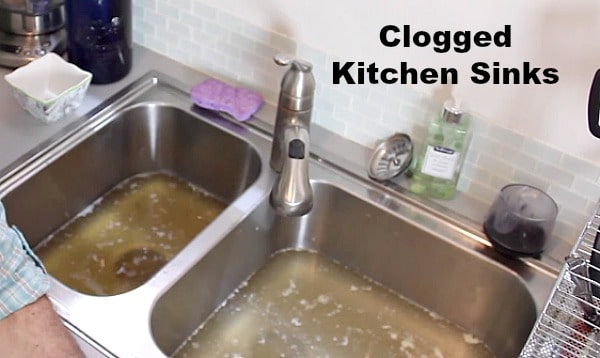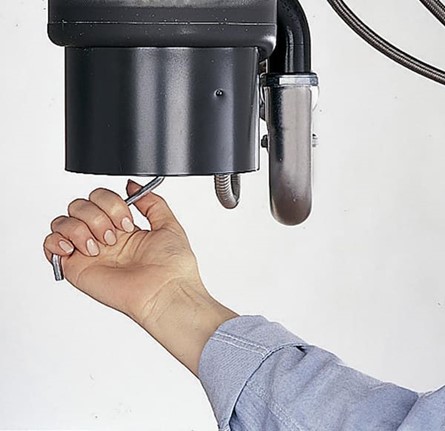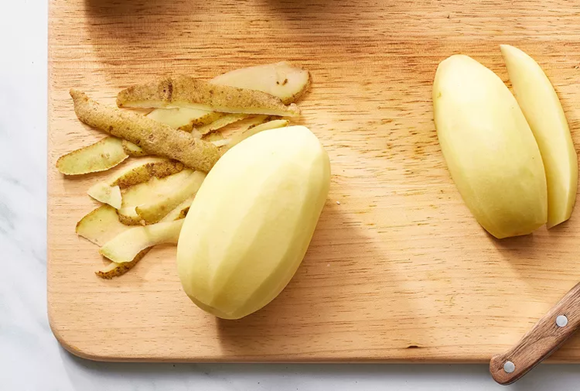Professional Plumbers Tell How to Prevent Kitchen Clogs
Recently a neighbor had a very clogged drain and the unclogging was not an easy fix. So it was with Connie’s experience in mind when I recently read an article in Martha Stewart’s latest newsletter on how to prevent the dreaded clog. She polled several professional plumbers, and this is the advice they gave:

“When it comes to clogging a drain, there are some things you can do to prevent this messy and often expensive event, starting with what you pour down the drain.
“It's important to understand that your drainpipes are designed to handle fluids and debris from your toilet, dishwasher, and washing machine. Don’t ask them to do more than that. When it comes to your sink, very, very little should go down the drain, even if you send it through the garbage disposal."
Besides the damage to your plumbing system, pouring certain things like medications or bleach down the drain can release chemicals into your local water supply, harming the local ecosystem. Martha’s plumbing experts shared other things you should avoid pouring down the drain to keep your plumbing system in good working order. You might already know this, but in the off chance some of you don’t, here’s what to avoid:
My own 2 cents on the subject: At our house we keep the little wrench that’s needed for fixing the garbage disposal taped to the side of the disposal. A stuck disposal is stress-making; hunting around for the right tool only adds to the stress.

Lastly, we keep a stainless-steel compost bucket by the sink to catch the potato peels, rice and pasta, and egg shells. Coffee grinds can go into it too. If you don’t garden, but have neighbors that do, they’ll appreciate your contributions.

“When it comes to clogging a drain, there are some things you can do to prevent this messy and often expensive event, starting with what you pour down the drain.
“It's important to understand that your drainpipes are designed to handle fluids and debris from your toilet, dishwasher, and washing machine. Don’t ask them to do more than that. When it comes to your sink, very, very little should go down the drain, even if you send it through the garbage disposal."
Besides the damage to your plumbing system, pouring certain things like medications or bleach down the drain can release chemicals into your local water supply, harming the local ecosystem. Martha’s plumbing experts shared other things you should avoid pouring down the drain to keep your plumbing system in good working order. You might already know this, but in the off chance some of you don’t, here’s what to avoid:
- Coffee grounds (they accumulate in pipes, acting similarly to sediment and causing blockages)
- Egg shells (they create granular waste that can combine with other substances, such as grease, to create blockages)
- Grease (from bacon or ground beef, for example)
- Oil (vegetable, olive, melted butter or shortening)
- Rice and pasta (they continue to swell and can potentially block pipes, leading to backups and the need for professional intervention)
- Potato peels (when they meet water after a churn through a garbage disposal, they create a sticky paste that can contribute to clogs)

- Fibrous foods (celery, onion skins, rhubarb stalks, for instance)
- Bones and fruit pits (garbage disposals and pipes aren’t meant for hard things like bones and fruit pits; they can damage or break a disposal, making for potentially costly repairs)
- Paint (think about cleaning paintbrushes and paint rollers outside with the garden hose)
- Produce stickers (sending too many down the drain—either on purpose or accidentally—can create blockage because they can stick to pipes)

My own 2 cents on the subject: At our house we keep the little wrench that’s needed for fixing the garbage disposal taped to the side of the disposal. A stuck disposal is stress-making; hunting around for the right tool only adds to the stress.

Lastly, we keep a stainless-steel compost bucket by the sink to catch the potato peels, rice and pasta, and egg shells. Coffee grinds can go into it too. If you don’t garden, but have neighbors that do, they’ll appreciate your contributions.
 Alice Osborne
Alice Osborne
Weekly Newsletter Contributor since 2006
Email the author! alice@dvo.com
